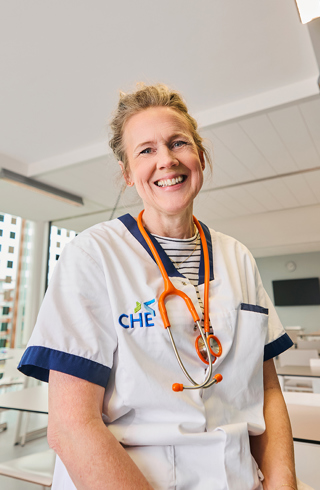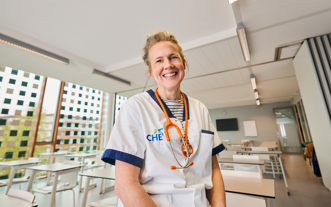Course in short
Do you work as a nurse, a social worker or a social scientist? And are you thinking of working abroad? Or are you interested in immersing more deeply into your work with migrants in the Netherlands? Then the post-graduate course International Public Health may offer you the perfect programme to prepare for your mission abroad or deepening your knowledge of and practical skills for your present job.
✅ English postgraduate
✅ Guest speakers from Doctors without borders, Medair, Mercy Ships en Red cross.
✅ A combination of both theory and practice within intercultural communication and projectmanagement.
✅ Many trainees have started working on projects in the Netherlands and abroad (humanitarian or development) after IPH.
✅ There are many master's programs in Global Health and Public Health; we are the only post-graduate program that makes a connection between theory and practice.
✅ Both coordinators have international experience.
Course details
The course in International Public Health educates health workers, as well as social workers and social scientists, who are able to:
- analyse health problems at a local level in a low income country and to relate this to international standards;
- develop sustainable interventions for health problems in close cooperation with local stakeholders;
- contribute to the development, implementation and evaluation of (aspects of) integral health care in both long term development aid programs and (short term) emergency aid interventions;
- shape leadership within international project management;
- train local health workers in a culturally sensitive way.
A relevant completed bachelor's degree and relevant job experience for at least one year (not necessarily in a low income country) and a good command of the English language, verbally as well as in writing.
We accept the following qualifications:
- IELTS: a minimum score of 6 (overall band score) - not older than two years.
- TOEFL: TOEFL iBT with a minimum score of 80 - not older than two years.
- Cambridge: B2 (First), C1 (Advanced) or C2 (Proficiency)
Visa
Do you live abroad? Then you need a visa to follow the training. More information about this process can be found on the IND website.
The course is organised by a number of self-contained learning units (modules). Lectures will be given during sessions, followed by group activities, discussions, practical workshops and case studies. Active participation of all course participants is essential for the learning process. The various elements of the study programme will be catered for by lecturers who have extensive recent knowledge and experience in the field of community health in low income countries.
The content of the programme includes the following modules:
- Public Health and Migrant Healthcare
- Health Promotion
- Training Skills
- International Project Management
- Management of Humanitarian Assistance
This course teaches you how to analyse health problems (in countries with low and middle incomes) and how to communicate interculturally. Apart from this you will learn more about the Sustainable Development Goals and the topical issues of the ministry of development cooperation; water and sanitation, food security and sexual and reproductive health and rights. Subsequently, you will be able to develop interventions in close co-operation with international colleagues. From emergency interventions to long term development programmes. Of course, full attention is paid to the education of health workers, and participants are trained in international project management. You will be in lectures and seminars together with people who are going to work for Doctors without Borders, Medair, Médicins du Monde, VSO and similar organizations. This way, the programme allows you to build a network of relations within the work field. Besides, it provides ample opportunities to learn from each other.
The International Public Health course consists of the following modules and subjects, whereby 1 EC (European credit) represent 28 hours of study.
Module 1: Public Health and Migrant Health Care 15 EC (420 hours)
- Migrant health care 1.0 EC (28 hours)
- Primary health care and public health 1.0 EC (28 hours)
- Intercultural communication 1.0 EC (28 hours)
- Approaching vulnerable groups and human rights 1.0 EC (28 hours)
- Sustainable development cooperation 1.0 EC (28 hours)
- Tropical diseases 3.0 EC (84 hours)
- Emerging (lifestyle) Diseases 0.5 EC (14 hours)
- (Neglected) Tropical Diseases 0.5 EC (14 hours)
- Epidemiology 1.0 EC (28 hours)
- Child Health 1.5 EC (42 hours)
- Sexual and Reproductive Health 2.0 EC (56 hours)
- Mental Health 1.5 EC (42 hours)
Module 2: Training and Education Module (5 EC / 140 hours)
- Health Promotion * 2.5 EC (70 hours)
- Training Skills * 2.5 EC (70 hours)
Module 3: Management Module (10 EC / 280 hours)
- International Project Management 5.0 EC (140 hours)
- Management of Humanitarian Assistance 5.0 EC (140 hours)
TOTAL 30 EC (840 hours)
The course takes 9 months (from October to June) and contains 20 tutorial days at the CHE and via e-learning. The study load is about 20 hours per week.
The International Public Health Course is registered by CPION, ‘Centrum voor Post Initieel Onderwijs Nederland’. This foundation aims at granting institutes who provide training courses at a post-graduate level an adequate system of quality control, in order to meet recognized standards within national as well as international perspectives.
The IPH course is accredited by V&VN for 118 credits.
Practical information
Expected: 15 September 2026
Module 1: Public Health and Migrant Healthcare
Will follow later.
Module 2: Health promotion & Training skills
Health promotion:
Will follow later.
Training skills:
Will follow later.
Module 3: International project Management (IPM) and Management of Humanitarian Assistance
Will follow later.
Purchase of literature.
It is possible to follow separate modules. Below are the costs per module.
- Module 1 | Public Health and Migrant Healthcare: €1400
- Module 2 | Health Promotion and training skills: €1650
- Module 3 | International Project Management & Management of Humanitarian Assistance: €1400
When registering, you can choose whether you want to pay the amount in installments by direct debit or in one go by invoice. The invoice will be sent to the invoice email address you provided prior to the start of the training.
Proven Quality
CHE has consistently ranked among the top universities of applied sciences in the Netherlands!
In the 2025 edition of the Keuzegids Hoger Onderwijs, we are ranked 2nd in the category of medium-sized universities of applied sciences.
Our lecturers and trainers come straight from the field—or still work in it—and you can tell! This also applies to our part-time programmes.
✔️ CEDEO-accredited with impressive customer satisfaction scores (2025 survey):
✅ 96.3% for customised programmes
✅ 93.3% for open enrolment courses
In addition, several of our programmes are officially registered as post-bachelor (post-hbo) with CPION and classified under the NLQF framework.





